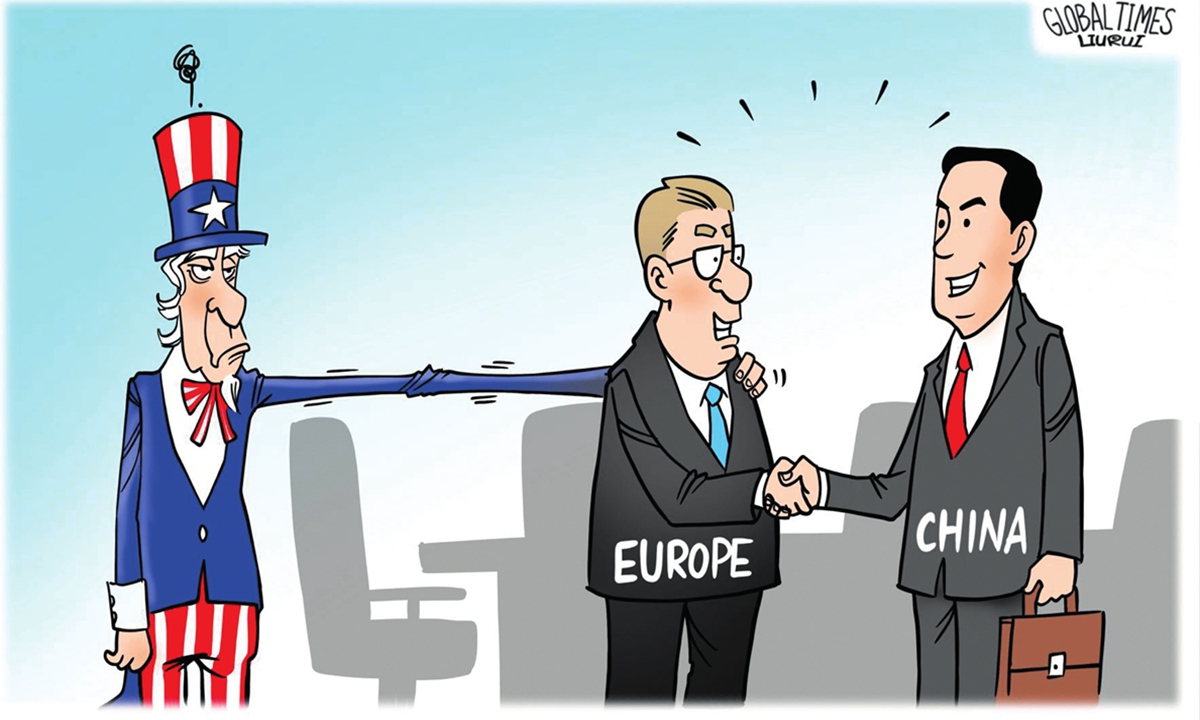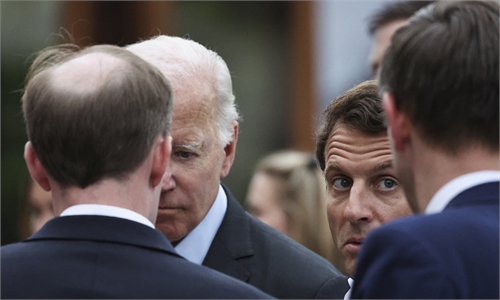Only a strategically autonomous Europe has a unique role to play between China, US

Illustration: Liu Rui/GT
Why is it that the desire in Europe to exercise strategic autonomy over its relationships involving China and the US is such a cause of tension with the US, but not China?
Because strategic autonomy is all about a state - or group of states - not being coercively dependent upon another, French President Emmanuel Macron's remarks appear to be common sense.
Macron spoke bluntly during his recent visit to Beijing of the need for the EU to beware of being dragged into a crisis over the Taiwan question which would be entirely of America's making. Europe must not become a US follower, a vassal even, as it would simply not be in the interests of its member nations, he said.
Such statements provoked some dissent from within the European community, because the EU is a fragmented organization with each nation having an equal voice. And the dissent focused on objections not to the principle of strategic autonomy, but to the direction it might take.
And in the wake of the recent stream of European leaders' visits to China, an article in the Financial Times said that the stream comes with a risk and that "carving out an independent path is all good and well, but acting differently from the US just for the sake of it is merely contrarianism."
Washington, on the other hand, took a different view that its ally should have the temerity to challenge Washington's worldview. Some prominent politicians in the US even suggested that if Europeans did not want to side with them over Taiwan the US might consider withdrawing the billions of dollars worth of support it has been sending to Ukraine.
America behaved like a partner overwhelmed with jealousy because it is not the center of everyone's attention. This is because Washington wants to recruit Europe in its new Cold War against China: like all abusive relationships, it is not about mutual benefit, it is about power and control. The more nations which behave in a manner conducive to a multipolar worldview, the greater the US feels its dominance challenged. The US sees China as an existential threat to its hegemony. The Biden administration has made it clear almost from its first day in office that one of its policy goals has been to isolate China economically. Europe's interests are not always the same as America's, or China's, but, in contrast to Washington, only Beijing seems comfortable with the notion of the EU developing its own strategic autonomy, independent of America.
The concept of strategic autonomy is a familiar one in Europe, where it originated a decade ago as a geopolitical device concerned with issues surrounding communal defence in its region, though this has since evolved to encompass matters of economic and foreign policy. It has even been called "European sovereignty." In practice, it is about making decisions which most benefit the EU or in doing so, the wider good. It also means not slavishly following American interests. Why does it not mean automatically following China's path? Because China does not require it to. China does not require other nations with which it interacts to blindly do its bidding. The US, on the other hand, requires, for example, other nations to impose sanctions where Washington believes they should be imposed, or be prepared to suffer economic consequences themselves. However, even when nations conform to Washington's demands it can have catastrophic knock-on effects upon trading relations.
Even in Britain, now outside the European Union, there are those who see the pragmatic logic of rejecting the US urging to decouple from China, as the potential for economic damage is obvious. The UK's Foreign Secretary James Cleverly has spoken out against some in his ruling Tory party who want the country to disengage with Beijing. Hawkish party cliques want the kind of disengagement and tougher lines which Washington would welcome, but Cleverly told The Guardian newspaper that it would be "really, really, really counterproductive" for London not to engage with Beijing.
If it adheres to a policy of strategic autonomy, Europe can have a unique role to play in the standoff between China and America. Without it, Beijing could justifiably be concerned of the increasingly likelihood that an anti-China West, dominated and led by Washington, would consummate the new Cold War which America seems to want.
However, with strategic autonomy functioning, the US would not be able to take Europe for granted and therefore perhaps be more inclined to reign in some of its more reckless foreign policy adventures.
The author is a journalist and lecturer living in Britain. opinion@globaltimes.com.cn

